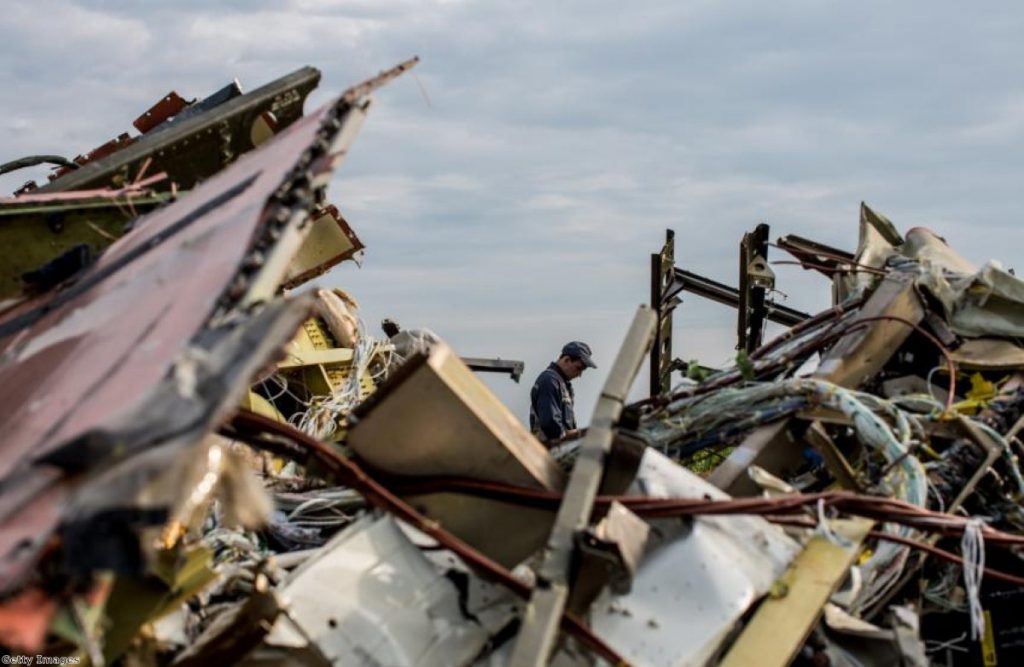MH17 diplomacy: Grim and determined, Britain confronts Russia
David Cameron has won support from Paris and Berlin for further sanctions against Russia, in a big step forward for Britain's diplomatic offensive against Russia in the aftermath of the MH17 crash.
The prime minister spoke with Angela Merkel and Francois Hollande this morning about the aftermath after penning a newspaper article insisting the tragedy over Ukraine was a "challenge to be met and mastered".
Germany and France have been reluctant to pursue a confrontational approach with Vladimir Putin.
But Cameron, who used his article to call on western states to "turn this moment of outrage into a moment of action" against the Russian president, appears to have won them over.


"All three leaders agreed that the immediate priority is to secure access to the crash site and to ensure that specialist teams are able to recover the victims and return them home," a Downing Street spokesman said.
"They agreed President Putin has an important role to play by persuading the separatists to grant access and to work with the international community to ensure that all that needs to be done can be done as soon as possible.
"They also agreed that the EU must reconsider its approach to Russia and that foreign ministers should be ready to impose further sanctions on Russia when they meet on Tuesday."
The pursuit of sanctions is accompanied by plans for a hostile security council resolution and the offer of military assistance to the Ukrainians.
"This is not about military action, plainly," the prime minister wrote in an article for the Sunday Times newspaper.
"But it is time to make our power, influence and resources count."
Russia is now widely thought to have supplied the missile which killed 298 people, including ten Britons, by shooting the Malaysian Airlines flight out of the sky on Thursday afternoon.
Britain blames Putin for failing to provide international investigators with full access to the crash site. Bodies and wreckage have already been removed but forensic experts believe there could still be sufficient evidence to conclusively prove what caused the tragedy.
"What we're seeing from the Russians is obfuscation and obstruction at the moment," new foreign secretary Phillip Hammond told BBC1's The Andrew Marr Show.
"The Russians will have more information about this incident than anyone. They are saying nothing."
Hammond, who this time last week was defence secretary, said it was not possible to get access to the crash site "unless you want to fight your way in".
He pointed out the Russian president was the one person who could "snap his fingers and it would be done". He added: "For all the fine words from Moscow, it hasn't happened."
As the body of circumstantial evidence pointing to a surface-to-air missile being fired from a rebel-held area grows, a split had emerged in Europe about how to tackle the crisis.
Britain is pushing for an extension of existing sanctions. Hammond will speak with his German counterpart, Frank-Walter Steinmeier, this afternoon, calling on Berlin to accept the need to increase the pressure on Moscow ahead of a meeting of European foreign ministers in Brussels on Tuesday.
The UK is also looking to increase its military support for the Ukrainian government.
Hammond said it was "vital" for western states to "reassure the eastern members of the Nato alliance we stand behind the collective security guarantee".
British Typhoons are flying policing missions out of Lithuania and the Army and Navy are engaged in Baltic exercises, Hammond revealed.
"You can assume western countries including Britain will want to provide the legitimate government of Ukraine with all the support it can," he said.
He confirmed this will include an increase in the amount of "technical support and advice" Britain gives to Kiev.
It is the diplomatic offensive against Russia which is Britain's main response to Thursday's crash, however. In New York tomorrow, the British, Australians and Dutch will put forward a UN security council motion calling for greater access to the crash site.
Cameron used his newspaper article to allude to the dangers of appeasement, in a strongly-worded appeal to Berlin for a change of heart.
He wrote: "In Europe we should not need to be reminded of the consequences of turning a blind eye when big countries bully smaller countries.
"We should not need reminding of the consequences of letting the doctrine of 'might is right' prevail. We should not need to be reminded of the lessons of European history."
He warned that last week he saw a "reluctance" to confront Russia in Brussels last week which needs to change.
"Some countries, with Britain at the forefront, have consistently pushed for action that reflects the magnitude of the long-term threat," Cameron added.
"They tend to be the countries with the closest physical proximity to Russia and the most direct experience of what is at stake.
"Their own independence and nationhood have come at a high price. They never forget it.
"But others seem more anxious to make this a problem to be managed and contained, not a challenge to be met and mastered."
Russia has responded to Britain's moves by claiming they will only lead to more deaths.
Its ambassador to the UK, Alexander Yakovenko, has warned sanctions would "encourage the Ukrainian authorities to continue violence".
Labour leader Ed Miliband offered his support to the UK's confrontational approach yesterday.
In a speech to the party's national policy forum, he said Europe's clear responsibility was "to work with the United States to send a clear message to President Putin to stop the flow of arms and military support to Russian separatists and respect the sovereignty of Ukraine".

